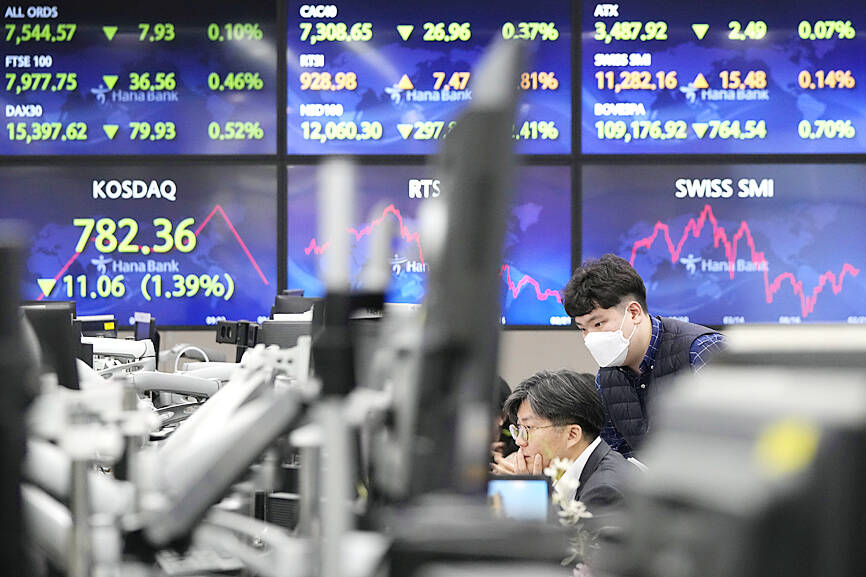Asian financial stocks fell for a second day as the failure of Silicon Valley Bank (SVB) deepened concerns that soaring interest rates are eroding balance sheets across the sector.
The MSCI AC Asia Pacific Financials Index dropped as much as 1.3 percent yesterday, hitting its lowest level since Dec. 20 and adding to Friday’s 2.2 percent slump.
Japanese bank shares were particularly hard hit, with a gauge tracking the sector falling 4 percent after slumping 5.4 percent on Friday.

Photo: AP
Asian lenders declined even as US authorities on Sunday raced to stem jitters about the health of the nation’s financial system, pledging to fully protect all depositors’ money following the collapse of SVB while also giving any banks squeezed for cash easier terms on short-term loans.
Fears of contagion from the largest US bank failure since the 2008 financial crisis are spreading around the world, upending the outlook for everything from riskier assets to US interest rates.
Despite US government intervention, stalwart investors such as Pershing Square founder Bill Ackman predict more casualties in the US banking system, and some start-up founders have warned that SVB’s failure could lead to wipeouts in the sector.
“The market should not underestimate the risks of SVB saga, as its problems are not unique, including rising financing costs and huge investment losses due to asset-debt maturity mismatch,” China International Capital Corp (中國國際金融) analysts including Liu Zhengning (劉政寧) wrote in a note on Saturday.
It might be worth showing some “attention to non-bank financial institutions, which may be sitting on high leverage and maturity mismatch as they stayed in low interest environment for too long,” they said.
Mitsubishi UFJ Financial Group Inc, Sumitomo Mitsui Financial Group Inc and Japan Post Bank Co all fell more than 3 percent. South Korea’s Shinhan Financial Group Co and Hana Financial Group Inc slumped before erasing losses, while Australia’s ANZ Group Holdings Ltd and National Australia Bank Ltd dropped more than 1.5 percent each.
“The point that caught the eye of the bond market is that SVB has sold most of its available-for-sale bonds, which carried net unrealized losses,” SMBC Nikko Securities analyst Masao Muraki wrote in a note on Friday.
“There are concerns that other US banks and Japanese banks/life insurers will follow suit amid renewed inflation fears and rising long and short-term interest rates,” Muraki wrote.
To be sure, some market participants have said that Asia is likely to face limited contagion risk due to superior growth prospects, lenders’ diverse customer base and improving asset quality.
Banking stocks in China and India bucked a broader weakness in the sector amid low exposure to the US. Industrial and Commercial Bank of China (中國工商銀行) rose as much as 3 percent, while India’s ICICI Bank Ltd advanced 1.5 percent.
Elsewhere, a measure of the biggest Philippine banks slid as much as 1.9 percent as all of its nine components declined. Bank of the Philippine Islands, Security Bank Corp and Rizal Commercial Banking Corp each fell more than 2 percent.

Taiwan Semiconductor Manufacturing Co (TSMC, 台積電) last week recorded an increase in the number of shareholders to the highest in almost eight months, despite its share price falling 3.38 percent from the previous week, Taiwan Stock Exchange data released on Saturday showed. As of Friday, TSMC had 1.88 million shareholders, the most since the week of April 25 and an increase of 31,870 from the previous week, the data showed. The number of shareholders jumped despite a drop of NT$50 (US$1.59), or 3.38 percent, in TSMC’s share price from a week earlier to NT$1,430, as investors took profits from their earlier gains

In a high-security Shenzhen laboratory, Chinese scientists have built what Washington has spent years trying to prevent: a prototype of a machine capable of producing the cutting-edge semiconductor chips that power artificial intelligence (AI), smartphones and weapons central to Western military dominance, Reuters has learned. Completed early this year and undergoing testing, the prototype fills nearly an entire factory floor. It was built by a team of former engineers from Dutch semiconductor giant ASML who reverse-engineered the company’s extreme ultraviolet lithography (EUV) machines, according to two people with knowledge of the project. EUV machines sit at the heart of a technological Cold

AI TALENT: No financial details were released about the deal, in which top Groq executives, including its CEO, would join Nvidia to help advance the technology Nvidia Corp has agreed to a licensing deal with artificial intelligence (AI) start-up Groq, furthering its investments in companies connected to the AI boom and gaining the right to add a new type of technology to its products. The world’s largest publicly traded company has paid for the right to use Groq’s technology and is to integrate its chip design into future products. Some of the start-up’s executives are leaving to join Nvidia to help with that effort, the companies said. Groq would continue as an independent company with a new chief executive, it said on Wednesday in a post on its Web

CHINA RIVAL: The chips are positioned to compete with Nvidia’s Hopper and Blackwell products and would enable clusters connecting more than 100,000 chips Moore Threads Technology Co (摩爾線程) introduced a new generation of chips aimed at reducing artificial intelligence (AI) developers’ dependence on Nvidia Corp’s hardware, just weeks after pulling off one of the most successful Chinese initial public offerings (IPOs) in years. “These products will significantly enhance world-class computing speed and capabilities that all developers aspire to,” Moore Threads CEO Zhang Jianzhong (張建中), a former Nvidia executive, said on Saturday at a company event in Beijing. “We hope they can meet the needs of more developers in China so that you no longer need to wait for advanced foreign products.” Chinese chipmakers are in